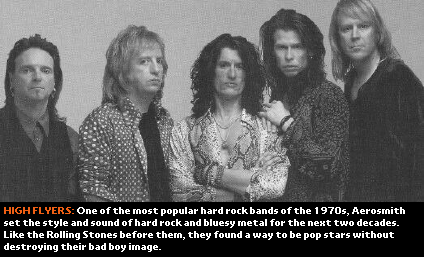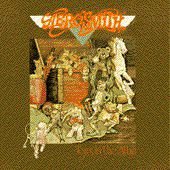|


"Sweet Emotion"
Aerosmith
Columbia 10155
Jul. 1975
Billboard: #36
 
  he mid-Seventies hosted a much more deliberate and manipulative method of commercializing pop music, a process that continues to this day. Record labels (and by association, most of the artists who worked for them) started to aim their product at the lowest common denominator -- demographic studies. As a result, pop music became bland and lacked attitude; music without a discernible attitude is music that lacks perspective, and music that lacks perspective is essentially pointless. Just a glance at some #1 hits will reveal the mush that we were being force-fed in 1975: "Mandy," "Love Will Keep Us Together," "Laughter in the Rain," "Listen to What the Man Said," "Thank God I'm a Country Boy," and "Rhinestone Cowboy." he mid-Seventies hosted a much more deliberate and manipulative method of commercializing pop music, a process that continues to this day. Record labels (and by association, most of the artists who worked for them) started to aim their product at the lowest common denominator -- demographic studies. As a result, pop music became bland and lacked attitude; music without a discernible attitude is music that lacks perspective, and music that lacks perspective is essentially pointless. Just a glance at some #1 hits will reveal the mush that we were being force-fed in 1975: "Mandy," "Love Will Keep Us Together," "Laughter in the Rain," "Listen to What the Man Said," "Thank God I'm a Country Boy," and "Rhinestone Cowboy."
 | "Sweet Emotion" is a key track on Aerosmith's third album, Toys in the Attic. Released in April 1975, the album peaked at #11 and stayed on the Billboard Hot 200 chart for a total of 128 weeks. It had sold 5 million copies by 1989. |
|  |
In the '70s, many of the talented artists of the time were either embarrassed by or feigned indifference to the overtly commercial nature of the Top 40. Ignoring it was probably the closest that they could come to upholding whatever idealism was still lingering from the '60s, so they saved their best bits for album release. Some ideology. While the artists could self-righteously claim to be noncommercial, their audience was now buying six dollar albums instead of a pair of ninety-nine cent singles. What does this have to do with Aerosmith? As I said, attitude in pop music is not only a good thing, but essential for it to retain any semblance of validity. Without attitude, music has no spark, and in the '70s a spark was definitely needed. Aerosmith was loaded with attitude, so it was fully capable of re-instilling rock and roll with plenty of what it lacked. They weren't embarrassed when the record company wanted to release a good hit single either and, like the Rolling Stones before them, they found a way to be pop stars without destroying their bad boy image. Aerosmith was a welcome hybrid of Rolling Stones raunch and Led Zeppelin swagger. Mick Jagger and Jimmy Page saw their personas mirrored by Steve Tyler and Joe Perry, respectively, but Aerosmith was more than a hard-rocking band of copyists. In the '70s, it was a perfect amalgam of familiar styles and future promise. As the sexual nature of pop music boiled to the surface (another result of the "lowest common denominator" syndrome), Steve Tyler was prepared. Androgyny, glam-rock, bedroom soul, and hard rock -- with its cocksure mannerisms and codpiece hardware -- were all the rage, and Tyler could master them all. Because of his unabashed willingness to embrace '70s sexual hedonism, wine, women, and song became sex, drugs, and rock and roll.
Rising from one of the hardest-working bar bands in their native New England to headliners before a crowd of a quarter-million at 1977's California Jam, Aerosmith earned its success the hard way. The band kept a grueling tour schedule, but hard work aside, Perry's killer guitar riffs and Tyler's attitude made them impossible to ignore. On songs like "Sweet Emotion," Perry stacks riff upon riff while Tyler does exactly what he does best: shows off his own bad self and struts his stuff. Most pop rock had lost direction in the mid-'70s, but Aerosmith was doing its part to keep things on track. By fine-tuning mid-'70s hedonism into a commercial package that was as irresistible as it was unavoidable, Aerosmith became the cornerstone of a new generation called "Stadium Rock" that is still holding strong today.
- Thomas Ryan, American Hit Radio, Prima Entertainment, 1996.
 Reader's Comments Reader's Comments
No comments so far, be the first to comment.

|


